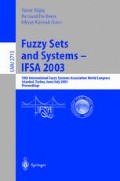Abstract
Philosophical grounding of theories are discussed within a frame-work of hierarchical levels of theoretical inquiry. Its application to classical and fuzzy set and logic theories are demonstrated within seven level of this hierarchy from ontological to application level.
Access this chapter
Tax calculation will be finalised at checkout
Purchases are for personal use only
Preview
Unable to display preview. Download preview PDF.
References
Bezdek, I.C.: Pattern Recognition with Fuzzy Objective Function Algorithms, Plenum Press, New York (1981)
Bilgic, T.: Measurement-Theoretic Frameworks for Fuzzy Set Theory with Applications to Preference Modeling, Ph.D. Thesis, University of Toronto, (supervisor, I.B. Türkşen) (1995)
Bilgic, T., Türkşen, I.B.: Measurement-Theoretic Justification of Connectives in Fuzzy Set Theory, Fuzzy Sets and Systems 76(3), (1995) 289–308.
Resconi, G., Türkşen, I.B.: Canonical Forms of Fuzzy Truthoods by Meta-Theory Based Upon Modal Logic, Information Sciences, 131 (2001) 157–194
Türkşen, I.B.: Type 2 Representation and Reasoning for CWW, FSS, 127 (2002)17–36
Türkşen, I.B.: Type I and Type II Fuzzy System Modeling, FSS, 106, (1999)11–34
Türkşen, I.B.: Theories of Set and Logic with Crisp or Fuzzy Information Granules, J. of Advanced Computational Intelligence, 3,4 (1999) 264–273
Türkşen, I.B.: Interval-Valued Fuzzy Sets and Compensatory AND, FSS, (1994) 87–100
Zadeh, L.A.: From Computing with Numbers to Computing With Words-From Manipulation of Measurements to Manipulation of Perceptions, IEEE, Trans. on Circuits and Systems, 45, (1999) 105–119
Zadeh, L.A.: Fuzzy Sets, Information and Control Systems, Vol.8, (1965) 338–353
Author information
Authors and Affiliations
Editor information
Editors and Affiliations
Rights and permissions
Copyright information
© 2003 Springer-Verlag Berlin Heidelberg
About this paper
Cite this paper
Türkşen, I.B. (2003). A Perspective on the Philosophical Grounding of Fuzzy Theories. In: Bilgiç, T., De Baets, B., Kaynak, O. (eds) Fuzzy Sets and Systems — IFSA 2003. IFSA 2003. Lecture Notes in Computer Science, vol 2715. Springer, Berlin, Heidelberg. https://doi.org/10.1007/3-540-44967-1_1
Download citation
DOI: https://doi.org/10.1007/3-540-44967-1_1
Published:
Publisher Name: Springer, Berlin, Heidelberg
Print ISBN: 978-3-540-40383-8
Online ISBN: 978-3-540-44967-6
eBook Packages: Springer Book Archive

